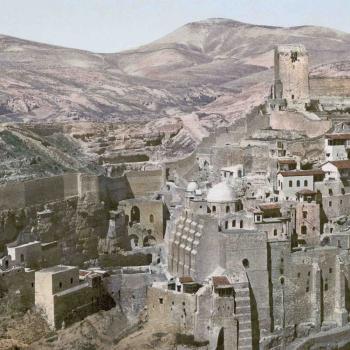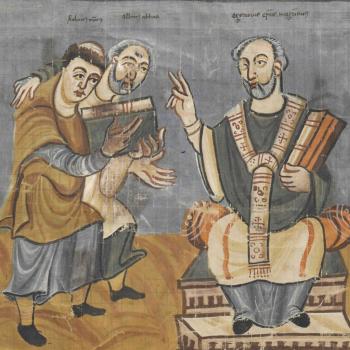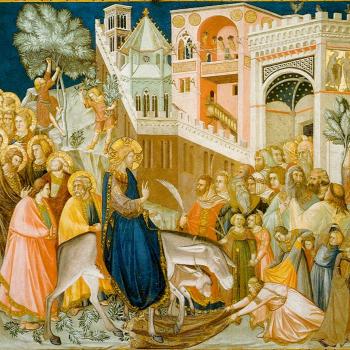The centennial of the First World War means that we have plenty of grim events to commemorate, and none more so than in this present year. 1916 was the point at which the war moved into the full-scale industrial mass production of death. We are already reading the accounts of the horrors of Verdun and the Somme, and other atrocities abounded.
One in particular demands our attention, although it is not well known beyond the ranks of specialist historians. Briefly, in October 1916, the German War Ministry began counting the number of Jews serving in its full time forces, in the so-called Judenzählung, or “Jewish census.” But why should that be regarded as such a momentous and even dreadful event? Let me offer some background.
In 1914, the major powers had gone to war in an atmosphere of religious euphoria, with a strong apocalyptic coloring. German Christians saw the coming of war in terms of Transfiguration, of a New Pentecost, and Holy War language appeared in all combatant nations. British politicians, meanwhile, were so immersed in evangelical and apocalyptic thought that they saw the return of the Jews to Jerusalem as a profound messianic sign. That mood led to the Balfour Declaration of 1917, when the British government promised a Jewish national home in the newly conquered land of Palestine.
But that religious zeal could also produce strongly negative consequences for Jews. At the start of the war, Jews in Western nations shared wholly in patriotic enthusiasm, which they interpreted through their own traditions. If Christians presented their soldiers as Crusaders, then Jews would be the new Maccabees. Even the great Martin Buber compared the German war effort to the heroic Maccabees. Philosopher Hermann Cohen published a widely hailed pamphlet on Deutschtum und Judentum, Germanism and Judaism, in which he lauded the German identity that he identified with its Old Testament roots. Such thinkers saw the war as a wonderful opportunity to achieve full recognition of their status as loyal citizens of the respective empires, to accomplish true assimilation. At such a moment, Zionism seemed like an adolescent fantasy.
At first, the war seemed to confirm Jewish hopes. Jews fought courageously at all levels, earning the highest decorations in each nation. Magnate Walther Rathenau kept German industry functioning through the worst of the Allied blockade, and staved off the nation’s collapse.
One problem with Holy War rhetoric, though, is that it offers few resources for dealing with failure and defeat. If a sanctified nation suffers defeats, that paradox can only be explained by the workings of some evil or Satanic force, which is subverting God’s cause. In Germany, that dark moment of realization came in 1916, when all hopes of easy victory had faded, and when casualties were mounting astronomically. Scapegoats had to be found, and Jews proved the obvious target.
The key issue was military service. According to popular folklore, Jews were not serving in the military in anything like their proper numbers, and even if they were, they were not in front line service. In 1916, the German war minister announced that the army would begin to tally Jewish representation in the front lines, through the Judenzählung. Now, had such a census been performed and reported honestly, it would have showed that Jews were in fact serving fully and faithfully, but the regime never released the figures, further boosting anti-Semitic conspiracy theories.
This affair was a cultural crisis for Jews who, up to this point, had regarded Germany as by far the best country in the world, the heart of Western civilization, science, and culture. Among many who found this a life-changing moment was author Arnold Zweig, who had served heroically since 1914. But news of the census reached him as he was fighting at Verdun in some of the most savage battles in human history. In his furious short story “Judenzählung Before Verdun,” Zweig imagined the angel Azrael blowing his horn to summon all the Jews who had died in the German lines, to determine how many had got themselves inconsiderately killed in action. As he wrote to Martin Buber the following year, “I now regard myself personally as a captured civilian and a stateless foreigner.” Perhaps after all, Judentum could not coexist with Deutschtum.
The Judenzählung was only the most visible sign of the anti-Semitism that now gained mainstream status, and that forced German Jews to reconsider fundamental issues of identity. Casting around for solutions, some turned to Zionism, an option made possible by the Balfour Declaration.
But many intellectuals turned back to their cultural roots, including aspects of Judaism that had been discarded in the headlong rush toward emancipation. German rejection promoted a new degree of ethnic and religious solidarity with those large Jewish communities who lived in more benighted countries, especially in the Russian and Polish Pale. Even before the war, Martin Buber had popularized the rich Hasidic cultures of the east, and with intellectuals like Zweig and Franz Rosenzweig, he promoted a revival of older Jewish values. In 1919, Gershom Scholem began his doctoral work on what was then considered the radically unfashionable topic of Kabbalistic mysticism. Fighting what he termed the censorship of the Jewish past, Scholem initiated the modern study of this vast portion of Judaism’s heritage.
The Great War taught Jewish thinkers unforgettable lessons about the limits of acceptance and assimilation, and the need to rediscover roots. But it also offered a terrible warning. If military setbacks could provoke such a reaction against Jews, who were accused only of hindering an ultimate German victory, what would happen if the nation were to suffer a crushing defeat?
Obviously not all German Jews reacted as strongly as those intellectuals, and most probably let the affair pass by as another casual insult. But warning flags were waving.
As Geoffrey Wheatcroft remarked, “The First World War changed everything: without it, there would have been no Russian Revolution, no Third Reich, almost certainly no Jewish state.” We might perhaps add, no modern Judaism in anything like the form in which we know it.
In ways familiar and not so familiar, modern Jewish history and Jewish culture are outcomes of that Great War.
















